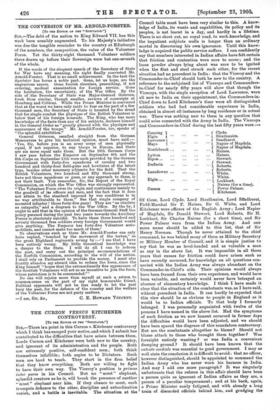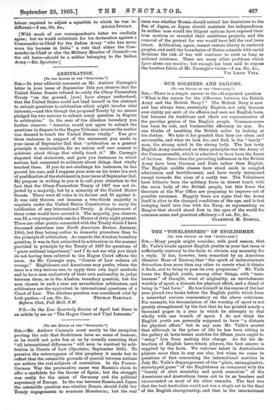THE CURZON VERSUS KITCHENER CONTROVERSY.
[To THS EDITOR Or THZ "Speouroa."] Sin,—There is a point in this Curzon v. Kitchener controversy which I think has escaped your notice, and which I submit has contributed to the difficulties that have arisen between them. Lords Curzon and Kitchener were both new to the country, and ignorant of its administration and the people. Both are extremely positive, self-confident men ; both think themselves infallible; both aspire to be Dictators. Such men are hard to teach. They start in the firm belief that they know everything. Both are willing to fight to have their own way. The Viceroy's position is primus inter pares in his Council. But no " must" elephant, splendid creature as he is, will brook the presence of another " must " elephant near him. If they chance to meet, each trumpets defiance to the other, discipline and subordination vanish, and a battle is inevitable. The situation at the Council table must have been very similar to this. A know- ledge of India, its wants and capabilities, its policy and its peoples, is not learnt in a day, and hardly in a lifetime. There is no short cut, no royal road, to such knowledge, and the impatient subjdnta walla is longer than an ordinary mortal in discovering his own ignorance. Until this know- ledge is acquired the public service suffers. I can confidently say that numbers interested in Indian affairs have felt certain that friction and contention were sure to occur; and the loose powder always lying about was sure to be ignited when the flint and steel struck each other, for the recent situation had no precedent in India: that the Viceroy and the Commander-in-Chief should both be new to the country. A reference to the subjoined list of Viceroys and Commanders- in-Chief for nearly fifty years will show that though the Viceroys, with the single exception of Lord Lawrence, were all new to India on their appointment, the Commanders-in- Chief down to Lord Kitchener's time were all distinguished soldiers who had had considerable experience in India, obtained in almost all instances by long residence or in actual war. There was nothing new to them in any question that could arise connected with the Army in India. The Viceroys and Commanders-in-Chief during the last fifty years were
f Clyde. "• 1 Strathnairn.
C Sandhurst. ••• / Napier of Magdala.
( Napier of Magdala.
"• / Haines.
... Haines.
... Stewart. f Stewart.
• " 1 Roberts. C Roberts. • - / White.
S White.
••• / Lockhart.
i Nairn° (for a time).
... Power Palmer.
Kitchener.
Of these, Lord Clyde, Lord Strathnairn, Lord SMndhurst, Field-Marshal Sir F. Haines, Sir G. White, and Lord Kitchener were officers of the English Army ; Lord Napier of Magdala, Sir Donald Stewart, Lord Roberts, Sir H. Lockhart, Sir Charles Nairne (for a short time), and Sir Power Palmer were from the Indian Army. And one more name should be added to this list, that of Sir Henry Norman. Though he never attained to the chief command, he was behind many of them as Military Secretary or Military Member of Council, and it is simple justice to say that he was as level-headed and as valuable a man as any in the above list. It was impossible in all these years that causes for friction could have arisen such as have recently occurred, for knowledge on all questions con- nected with the Indian Army was always abundant on the Commander-in-Chief's side. Their opinions would always have been framed from their own experience, and would have been valuable, and certainly would never have betrayed an absence of elementary knowledge. I think I have made it clear that the situation of the combatants was, as I have said, without precedent in India. It can hardly be expected that this view should be as obvious to people in England as it would be to Indian officials. To that body I formerly belonged. I was personally acquainted with twelve of the persons I have named in the above list. Had the symptoms of such friction as we now lament occurred in former days the difficulties would have been adjusted, and we should have been spared the disgrace of this scandalous controversy. But are the combatants altogether to blame P Should not blame attach to those who brought them together ? Was foresight entirely wanting ? or was India a convenient dumping ground ? It should have been known that the entente cordiale was essential to good government. I may as well state the conclusion it is difficult to avoid : that no officer, however distinguished, should lie appointed to command the Indian Army who has never worn his harness in India. And may I add one more paragraph P It was singularly unfortunate that the referee in this affair should have been a person quite as ignorant of Indian affairs as they are, a person of a peculiar temperament ; and at his back, again, a Primo Minister easily fatigued, and with already a long train of discarded officials behind him, and grudging the
Canning Elgin Lawrence t Mayo Northbrook ...
Lytton Ripon...
Dufferin Lansdowne ...
Elgin ...
Curzon
•• •
labour required to adjust a squabble to which he was in-.
[With much of our correspondent's letter we cordially agree; but we would substitute for his declaration against a Commander-in-Chief for the Indian Army " who has never worn his harness in India" a rule that either the Com- mander-in-Chief or else the Military Member of Council—on the old basis—should be a soldier belonging to the Indian Army.—ED. Spectator.]











































 Previous page
Previous page